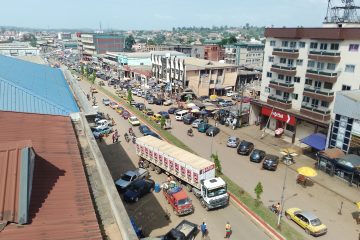By Dr. Benjamin Akih
Dear brothers and sisters,
We thank God Almighty who has blessed us with this beautiful country, Cameroon, and has given each of us a conscience and a sense of justice. If we affirm that Cameroon belongs to all of us, we must then figure out the best way to use our judgment and other talents to ensure that this country is governed effectively, according to the principles of constitutional democracy and federalism.

Let us keep our discussion today brief and to the point. We want to understand the difference between popular sovereignty and national sovereignty. We want to find out which one of the two is more foundational and what should we do to ensure that the foundation is solid. These ideas only make sense if we take active measures to bring our country closer in alignment with the best ideas about how to organize a just and flourishing society.
- Popular sovereignty and national sovereignty are two separate concepts, but popular sovereignty is more foundational so that once it is established, national sovereignty is made more secure.
- 1. Popular sovereignty is the idea that within a given nation, power belongs to the people; they are the true source of the government’s authority and legitimacy. Popular sovereignty is a fundamental principle of constitutional democracy; it prevents the emergence of brutal tyrants who take the people captive and then govern them as a patrimonial state.
- 2. National sovereignty is the idea that every nation has the right to govern itself within well defined boundaries of its sovereign territory. National sovereignty is a fundamental principle in international rule of law among nations. This principle protects small nations from aggression by big nations or forceful annexation and trading of entire nations by gangster nations.
- 3. In general, the community of nations is plagued by the virus of some aggressive nations disregarding the principle of national sovereignty and treating sovereign nations as special interests of other greedy nations. But in this mayhem caused by international amorality, a country’s national sovereignty is more securely protected by strongly anchoring its management on the principle of popular sovereignty.
1.4. When a country is taken captive by a dictator or a one-party system that pretends to be organizing multiparty elections but maintains a certain family, tribe, or clique in power, then a dangerous situation is obtained where the country’s national sovereignty can easily be undermined by a foreign nation that allies with a disgruntled faction within the nation that abuses popular sovereignty. When the sovereignty of a nation has been seized from the people to whom it properly belongs, a section of the people or a majority can then ally with a foreign power in pursuit of the power associated with the sovereignty of the state. A shrewd gangster nation seeking to take advantage of the improperly grounded national sovereignty first pretends that their main interest is to restore power to the people to whom it belongs. But in reality, they seek a kind of hidden or not so hidden neo-colonialism and imperialism.
1.5. The citizens of a nation whose national sovereignty is not well grounded in the more fundamental popular sovereignty must undertake everything in their power to ensure that they restore their popular sovereignty. If the constitution and ballot box are taken captive, these must first be targeted for liberation and that focused liberation can include physical force by conscientious citizens, well calculated and aimed at liberating the ballot box and the constitution from the grip of a tyrant or any gang of thieves posing as statesmen. Protests, including armed protests, in defense of the spirit of the constitution and the sanctity of the ballot box are patriotic acts which history can never forget to honor, even if such acts are made to appear as treason by usurpers of popular sovereignty.
1.6. The leaders of a state whose national sovereignty is not properly grounded on transparent and fair exercise of popular sovereignty constantly live in fear of their people and other gangster states. They therefore resort to mercenaries and costly alliances with other gangster states for short term benefits. Sometimes, they try to enlist the help of their people to fight against an imagined eminent threat to their way of life. By such trickery, they hope to endear themselves to the people whose sovereignty they have usurped. No one should be deceived by such subterfuge. The ordinary citizens, who should enjoy the benefits conferred on them by both popular sovereignty and the associated national sovereignty now face two enemies: the tyranny of their self-imposed leaders and potential invasion from aggressive gangster nations. Further, dictators leading nations where the national sovereignty is not properly based on popular sovereignty can sell their country to foreigners, in exchange for a few more years in power so that their families can loot the sinking ship.
1.7. We therefore see the importance of popular sovereignty both in protecting the liberties of the people at home and in reducing the probability of being attacked by gangster nations seeking new colonies and vassal states.
- The government of Cameroon, not being justifiably grounded in the popular sovereignty of the Cameroonian people, cannot claim to possess secure national sovereignty. This explains the government’s expensive reliance on external protectors for the projected semblance of an independent state.
2.1. Popular sovereignty and national sovereignty are hotly debated concepts. In 2024, the French Conseil d’etat carried out a study of the concept of sovereignty, given its frequent use in political discourse today. The clear distinction between popular sovereignty and national sovereignty or their internal and external manifestation. They did conclude that, “sovereignty is the freedom to choose, the ability to decide to not be a pawn of fate, and the foundation of a freely chosen way of living together. In France, it belongs to the people, who exercise it directly or through their representatives.”
2.2. These late debates and study on sovereignty relate to the slow adoption of the principle of popular sovereignty in non-protestant states, on the one hand, and on the other hand, the persistent autocratic rule in European Catholic states and their colonies. We can say that it is intuitively grasped in states with a protestant foundation that popular sovereignty is the true basis of national sovereignty. When a nation lives according to this philosophy, even if it is a small country, it will succeed to unquestionably exert its national sovereignty in the community of nations. Such is the case in protestant Northern Europe. The Anglo-Protestant approach there is such that there is a hierarchy where popular sovereignty is foundational while national sovereignty is the external projection of the internal popular sovereignty through stable and just constitution, transparent and competitive elections, and general protection of minorities. This makes attacks on national sovereignty by any gangster nation less likely or a potential failure.
2.3. The nation of Cameroon was born in fraud. Since the Franco-Catholic system was established, there has always been the fear that a national spirit could develop and assert itself through genuine independence. That spirit has been combated by imprisoning nationalists, banning parties that enjoy the support of the masses, overriding the victory of the president chosen by the people in 1992. Those who mistakenly thought a young Paul Biya in 1982 was going to usher in genuine constitutional democracy with protected civil liberties were shocked by the nepotism, incompetence, and hostility to any signs of competition were disappointed. Just like we have said above, by 1984, Mr. Biya claimed to be leading a sovereign nation on behalf of the people of Cameroon, but the usurped people prayed for courageous forces among them to stop the tyrant. That led to the attempted coup in 1984. Mr. Biya got the message: Cameroon’s pretentious national sovereignty was not grounded in genuinely expressed popular sovereignty. That is why he rushed to Israel to get foreign military leaders and foreign countries to protect him. While Mr. Biya has done well to nurture good relations with major UN member states, he has paid a high price for trying to get each of them to protect him against his people. No doubt Israeli citizens came and posed in 2018 as fake Transparency International agents to attest to the victory of the man who owes his safety today and from whom they can easily get what they want.
2.4. As we approach the next presidential election, those who have robbed Cameroonians of their popular sovereignty are sharpening their deceitful tongues. They claim that they are defending Cameroon’s national sovereignty by proactively organizing electoral fraud with ELECAM. The fact that ELECAM is a machine that confirms the contrived motions de soutien accorded to Biya can be evidenced from the recent statement of the Secretary General at the Presidency, Mr. Ngoh Ngoh, who said:
Next time someone wants to talk to you about the age of the president. Answer like this: In October, Elecam will not organize the INJS competition, nor that of Fecaboxe or Fecalutte. Elecam will organize the presidential election, a meeting between a man and his people.
This statement does not hide the fact that they shameless country men who have taken the country captive, view elections as a simulated event to confirm their grip on power. A competitive election organized by an independent electoral body cannot be viewed as a meeting between one man – the self-declared deity, and the miserable people who rely on that man-deity for the very air they breathe. Cameroon has neither popular sovereignty nor national sovereignty. It only has a band of election thieves and looters who refuse to declare their asserts or respect the internal rules of their mafia organization that is camouflaged as a political party.
- It is our duty to bring Cameroon into alignment with that stable equilibrium of popular sovereignty that grounds national sovereignty and shields a country from the ravenous wolves in the community of nations.
3.1. We must begin by asserting the supremacy of the phrase, “We, the people”, over the Franco-Catholic doctrine of L’etat est un monstre froid et supreme. Nietzsche was right to diagnose the lie of such autocratic systems. The lie is this: “Moi l’Etat, je suis le people.” Popular sovereignty is wrapped up in this phrase “We, the people”. When a state is built on that foundation, their national sovereignty emerges from the reverse and correct principle: “We, the people, are the state”.
3.2. Dear brothers and sisters, these distinctions may seem trivial, but they form the basis of the agitation for independence for former Southern Cameroons. We cannot hold our country together with the deception that national sovereignty trumps popular sovereignty; that elections are a game to crown the comedy of motions de soutien and announce that a man-god “incarnates” the national sovereignty of a sovereign people reduced to beggars and miserable creatures. Let us fight for the restoration of our popular sovereignty so that it can lead us to the much desired but never attained national sovereignty. Let us continue to register to vote. Let us get our family members and friends register to vote.
May God bless you. And may God bless this beautiful country, Cameroon as we all fight to assert our popular sovereignty and thereby firmly establish our national sovereignty on a firm foundation of “We, the People”. We shall overcome.
February 16, 2025
Dr. Benjamin Akih, on behalf of
English Cameroon for a united Cameroon
Serving the nation since 2017
https://www.facebook.com/share/p/1DNty5FUsC/



